This “Limited Edition” Blu-ray is currently available from Radiance Films.
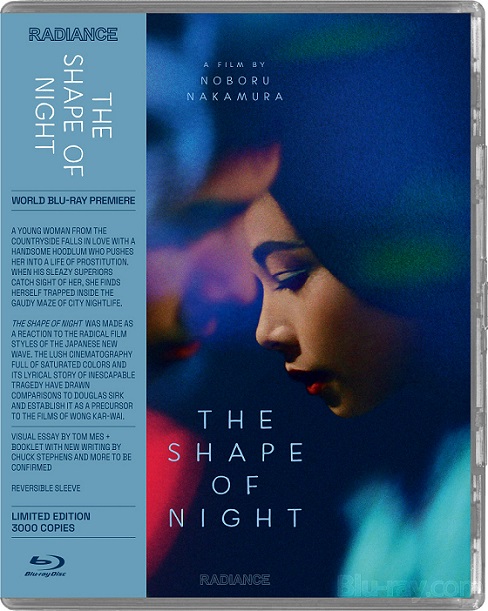
If you enjoy international cinema, then there’s little doubt that you should be following the releases of Radiance Films. Every month, they put out excellent but somewhat obscure titles from other parts of the globe. The Shape of Night is one of those pictures. It’s a heavy Japanese drama focused on a young factory worker/barmaid who gets involved with a mysterious figure who changes her life forever. While the film is extremely well regarded, it hasn’t been easy to see in English-speaking regions. That’s all changing for the better with the distributor’s Blu-ray release of this time.
The story begins with a direct and blunt streetwalker Yoshie Nomoto (Miyuki Kuwano) picking up new client Hiroshi Fujii (Kaisuke Sonoi). After spending some time with her, the client asks if the woman would like to give up prostitution, leave the city and start a new life with him. Surprisingly, she is resistant to his offer, although as time passes, she wonders if escape might be possible. The reason for her hesitation is told through flashbacks, as we see the 19-year-old Yoshie accidentally get herself involved in the sex trade.
One night working as a barmaid, patron Eiji Kitami (Mikijirô Hira) starts up a conversation. He’s initially very mysterious and charming, winning the naïve young woman over. It isn’t long before they’re romantically involved and Yoshie is smitten, but the initial joy vanishes when his physical behavior becomes more aggressive and his lies are revealed. The reason for the figure’s enigmatic acts is that he’s a low-level member of the yakuza with a gambling problem who is in serious debt with the organization. While some might think she could walk away, the poor Yoshie hasn’t much of a future at home and is immediately manipulated by her older lover. In order to make ends meet, he twists her arm and insists she engage in sex acts for money.
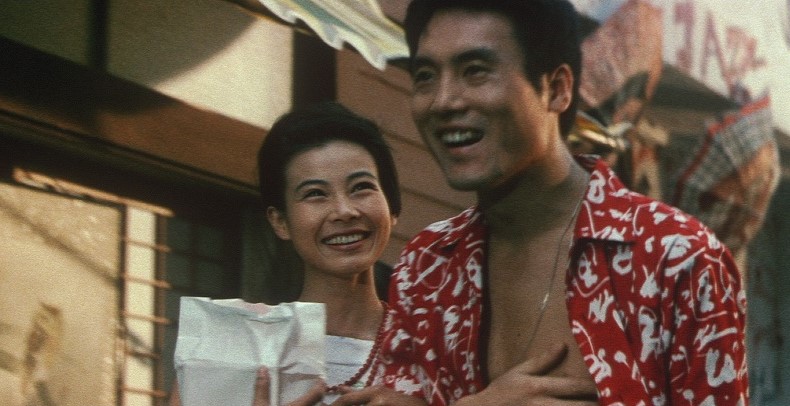
Things get worse and worse as the story progresses. Early on, Yoshie tries to leave, only to be taken and horrifically gang-raped by senior members of the yakuza. The sequence all takes place off-screen, involving figures leaving a room, putting on their shoes one after another and exiting the building. Viewers do see the traumatic aftermath as Eiji tries to help Yoshie to his apartment to recover. As she takes to the streets, Eiji also becomes jealous of her customers and physically abusive towards her. Several upsetting tragedies befall the protagonist, pushing her into a numb psychological state.
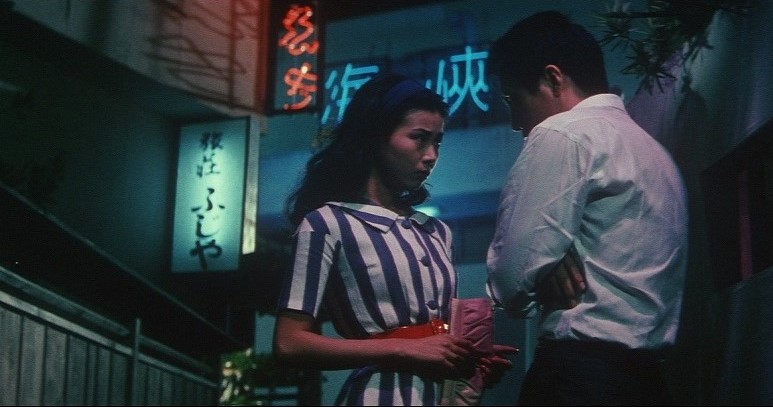
For a film made in the early 1960s, it holds up exceptionally well. The focus here is on character and the relationship between Yoshie and her equal parts cruel and pathetic wannabe gangster boyfriend/pimp Eiji. It is all presented in a surprisingly believable manner, often through close-ups and individual looks. One can see how Yoshie would fall prey to his advances and the ways he changes tactics to regain control and get her to serve him feels disturbingly authentic. It’s also interesting to see a detailed look into the world of prostitution and how it operates as Yoshie is given a crash course in what to do and how to sell herself.
The performances are excellent, with star Miyuki Kuwano really giving a remarkable performance. We see her as an innocent 19-year-old and follow her transformation into a jaded and detached sex worker in her mid-20s. While this is a stylish film shot in part with beautiful neon colors, the cast and the details provided in the story manage to maintain a feeling of authenticity throughout. Nothing is as graphic as you’d see in a modern movie on the same subject, yet it’s a picture that remains hard to shake. The ending, as Yoshie comes to a final decision on her future, is dark but memorable.
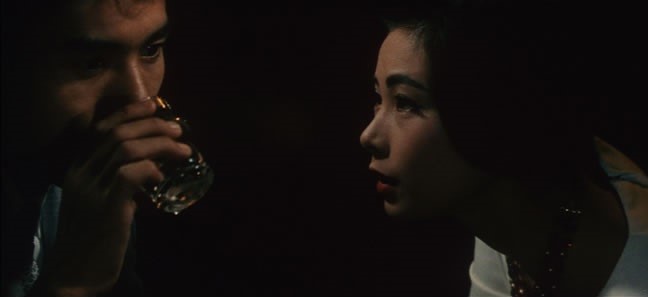
This is a very strong film and one that deserves to be seen by more around the world. The Radiance Films Blu-ray delivers a generally strong image. Admittedly, there is some grain and it doesn’t look as if any 2K or 4K restorations were done on the source material, but there are plenty of excellent shots with great image quality (particularly exteriors of the city and some of the neon-lit backstreets).
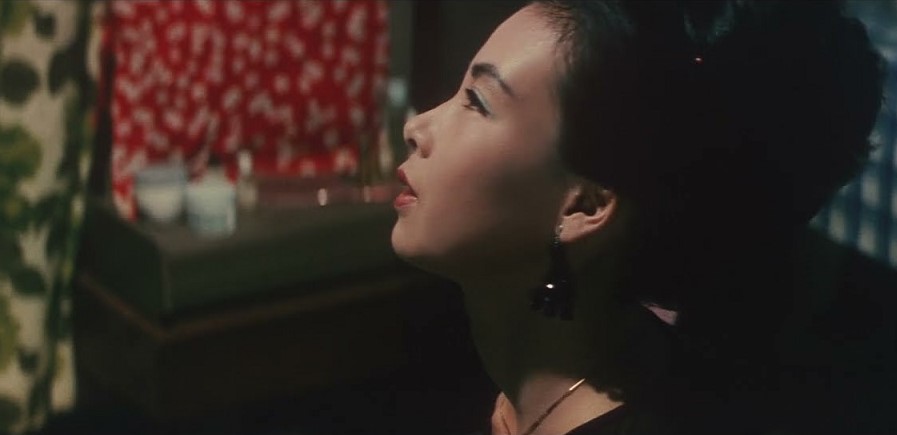
There are two extras that also help explain the history of the film and provide context for it in Japanese cinema. The first features an interview with the 80-year-old son of director Noboru Nakamura. He talks about his family’s history with Shochiku, the studio who produced the picture. Originally, the outfit was a theater troupe before getting into the film business – the interviewee’s grandfather actually worked for this collective. His father became a moviemaker at Shochiku and made several successful pictures there. While he had his own project ideas, he typically took on whatever job he was assigned. However, the son notes that his dad had a good idea of what modern audiences would respond to.
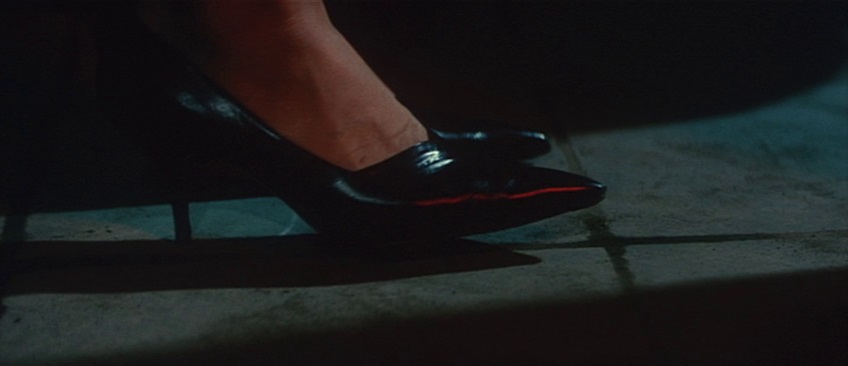
The man explains that Nakamura was also a bit of a workaholic and didn’t talk much about filmmaking at home, but that he does remember spending time at the studio and seeing this picture in a screening room when it was completed. The son remembers being proud of his dad’s accomplishment, saying it wasn’t the type of story he typically told but that he did it expertly and that, even today, he still gets comments about the picture. His memories are sweet to hear.
Additionally, there is another visual essay by a film historian on Shochiku and where the Japanese film industry was at this period in history. It seems that after the country’s golden era in the 1950s with Akira Kurosawa and other famous filmmakers, times and attitudes were changing. During the 50s, the company was known for making humanistic movies about the working-class that offered solutions to the issues raised and a feeling of hopefulness. As new young filmmakers emerged in the early 1960s, they were finding success with bleak material, offering no answers to the societal problems of the day.
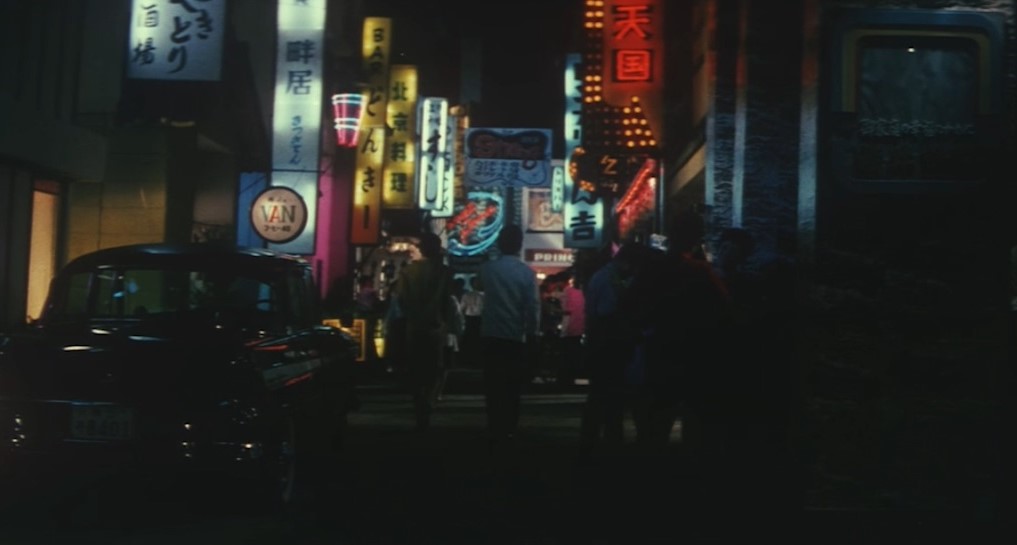
While Nakamura was older than this new wave of young filmmakers, it can be assumed that he managed to successfully combine the humanistic storytelling he was used to with a grittier and grimier story that ultimately delivers a finale more in keeping with modern times.
The Shape of Night is an excellent film and another title that this film reviewer would never have seen had Radiance Films not licensed and released it. This is a very detailed portrait of the life of a prostitute in the 1960s. Audiences will still be able to relate to its themes today and are certain to appreciate this “Limited Edition” Blu-ray if they pick it up.


